Feature
Nutrition for Growth
Multisectoral Efforts (Health)
"The Healthy Village Approach" to Preventing Non-communicable Diseases
Social and lifestyle changes have caused a drastic increase in the incidence of non-communicable diseases in the Solomon Islands. JICA is supporting the country's efforts to raise health awareness and to change behaviors and environments by training village-based health promoters.

Solomon Islands
Training Health Promoters to Change Lifestyles in Villages
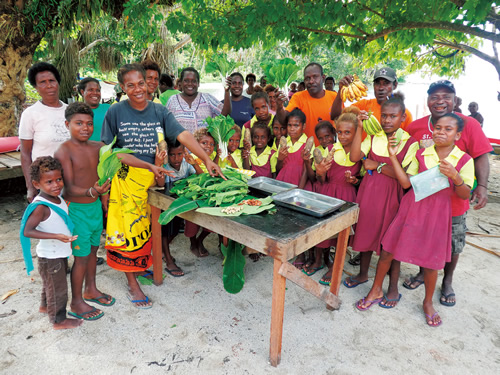
Healthy Village Promoters living in the village explain the characteristics of ingredients and how to eat a balanced diet..
Once upon a time, when the people used to eat fresh agricultural produce and had a traditional well-balanced nutritious diet, life expectancy was high in the Solomon Islands.
Since the 1980s, the country increasingly imported foreign ingredients and processed foods, such as rice, wheat, sugar, salt, instant noodles, and fried snacks. These foods began to occupy most of the people's diet. As a result, 59 percent of the population became overweight or obese, and about 60 percent of deaths are now caused by non-communicable diseases(NCDs) such as cardiovascular diseases and diabetes. In addition, the unbalanced diet brought about undernutrition such as stunting in children and anemia in mothers. Along with malaria, the Solomon Islands government recognizes NCDs as a top priority health issue. However, with about 80 percent of the population living in rural areas, access and delivery of public health services prove to be challenging.
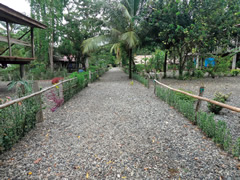
Clean-up and improvement of the village environment also led to clarification of land use and ownership.
To this end, JICA and the Solomon Islands Ministry of Health and Medical Services implemented the Health Promoting Village Project in 15 villages in the provinces of Guadalcanal and Makira-Ulawa. The aim is to prevent diseases and promote health at the village level by training community health volunteers, known as Healthy Village Promoters, who would provide health education and lead health promotion activities.
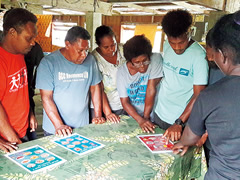
Healthy Village Promoters are trained by employees of the local health service of the Ministry of Health and Medical Services.
"We managed to educate people in our village based on what we learned during the training" enthused Densia Matei, a Healthy Village Promoter in Hulavu in Guadalcanal Province. "People used to eat an unbalanced diet before, but now they've come to consume a proper balance of carbohydrates, protein, and vitamins. In fact, the blood sugar level of several villagers has gone down." Kitchen gardening is also recommended as a way to regularly add vegetables in their daily meals.
Densia explained, "People grow agricultural crops in fields far from the village, and it takes a few hours to walk there and back. Kitchen gardens gave us easy access to fruits and vegetables."
Each village has two to five Healthy Village Promoters, who are each entrusted with the care of 20 to 30 households in their area. The Promoters lead clean-up efforts and establishment of village rules such as setting waste disposal areas and keeping pigs in pens. Maintaining clean surroundings helps to keep away diarrhea and malaria infection, as well as to prevent malnutrition caused by infectious diseases.
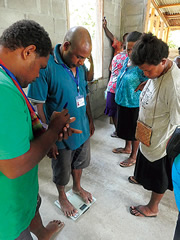
Healthy Village Promoters are trained by employees of the local health service of the Ministry of Health and Medical Services.
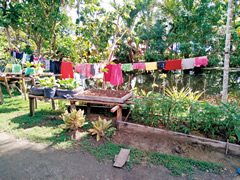
Vegetables such as spring onions, choy sum (also used in Chinese medicine), and aibika (locally known as slippery cabbage) are grown in kitchen gardens to facilitate the intake of a more balanced diet.

Vegetables such as spring onions, choy sum (also used in Chinese medicine), and aibika (locally known as slippery cabbage) are grown in kitchen gardens to facilitate the intake of a more balanced diet.
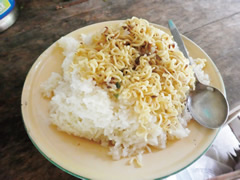
A modern meal prepared with imported ingredients
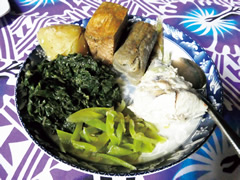
A healthy meal based on ancestral tradition
Better Environments in Schools and Markets
To realize the Healthy Islands vision, the government of the Solomon Islands takes a holistic approach in health promotion, called Healthy Settings. This effort encompasses not only Healthy Villages, but also Healthy Schools, Healthy Markets, and Healthy Workplaces.
For example, schools provide meals made with locally produced nutritious foods instead of processed foods, as well as toilet and hand-washing facilities. In food markets, the sale of tobacco products is prohibited, and fruit and vegetable stalls are kept separate from raw fish stalls.
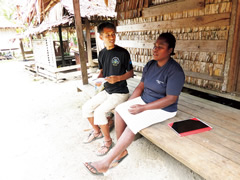
JICA Chief Advisor Hashimoto Ken talking with Densia.
JICA Chief Advisor Hashimoto Ken emphasizes that efforts should be made in a variety of settings. "In addition to working in villages, it's important to improve the environment at schools, marketplaces, and other places where people gather. We realized that such social changes would go beyond the authority of the Ministry of Health and Medical Services. So, we formed a national committee composed of the Ministry of Agriculture and Livestock, the Ministry of Education and Human Resources Development, the Ministry of Commerce, Industry, Labour and Immigration, and the Ministry of Women, Youth, Children and Family Affairs."
He added, "We want to implement activities holistically to improve lifestyles and environments, so that people can enjoy a healthy life wherever they are."




scroll